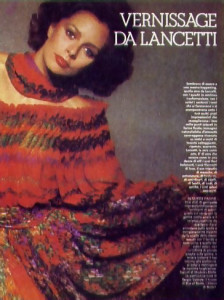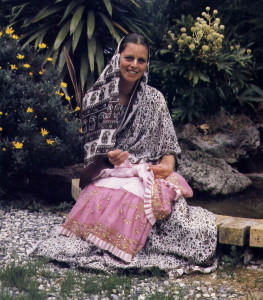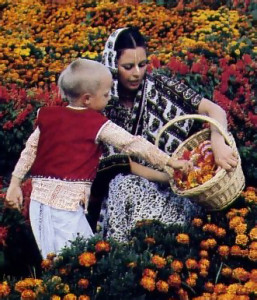From Haute Couture To Hare Krsna
How an “ugly duckling” became a swanlike devotee of God
 When Vicki Overton was growing up in Auckland in the 1950’s, duly attentive to her studies at St. Cuthbert’s College for girls, no one would have imagined she would one day be among the most sought-after fashion models in the world. (“My friends and I both thought I was an ugly duckling.”) But her admission to the University of Auckland at age seventeen proved to be the unlikely start of a meteoric modeling career that would take her to Europe and finally bring her, most amazingly of all, to the Hare Krsna movement. Recently we talked to Vicki, now thirty-three and renamed Jayasri-devi dasi, to get the story of her odyssey to Krsna.
When Vicki Overton was growing up in Auckland in the 1950’s, duly attentive to her studies at St. Cuthbert’s College for girls, no one would have imagined she would one day be among the most sought-after fashion models in the world. (“My friends and I both thought I was an ugly duckling.”) But her admission to the University of Auckland at age seventeen proved to be the unlikely start of a meteoric modeling career that would take her to Europe and finally bring her, most amazingly of all, to the Hare Krsna movement. Recently we talked to Vicki, now thirty-three and renamed Jayasri-devi dasi, to get the story of her odyssey to Krsna.
Jayasri-devi dasi: Before we begin I would like to thank Srila Bhagavan Goswami, my gurudeva, with all my heart and all my soul. Without his mercy I simply could not exist, and without him my life would have absolutely no meaning at all.
BTG: Jayasri, maybe you could start by telling us a little about how you first got into modeling.

Jayasri: Well, I entered the University of Auckland when I was seventeen, and my first year I spent in America—on scholarship in a school in Louisiana. I was staying with a photographer and his family. He took some pictures of me and sent them in to Seventeen magazine—they were running a competition—and somehow I won. So I flew up to Mississippi and did a whole series of advertisements for a big clothing firm. All of this got into the newspapers in New Zealand, and when I went back there a photographer for Vogue rang me up and asked if I would like to do some modeling. I started combining modeling with my university career. That went on for two years. Then, through my contacts at Australian Vogue, the biggest model agent in the world—Eileen Ford—got in touch with me and I left for New York.
BTG: And how did your career go from there? Did you stay in New York?
Jayasri: I stayed in New York from ’69 till ’73, and during that time I did covers for some of the biggest magazines: Seventeen, Mademoiselle, Glamour, Harpers Bazaar, Vogue of course. Then I went to Europe and did covers for Marie Claire, Jardin de Mode, Elle magazine. I worked for most of the big magazines.
BTG: What was it that first stimulated your interest in Krsna consciousness?
Jayasri: I’d always been looking for some sort of spiritual life. I remember when I was about ten years old I made a promise to God that I would be a teacher and a nun. But I didn’t want to be a nun in a convent, and I didn’t want to be a teacher in a school. I prayed to Him that if He would show me the way to do it, I would dedicate my life to Him.
 And so for many years this interest continued. My studies at the university were tied up with my search for God. I used to read everything I could about spiritual life. When I arrived in New York in ’69, the era of the flower children was just ending, and I became very interested in several schools there—esoteric schools, schools that taught yoga and philosophy.
And so for many years this interest continued. My studies at the university were tied up with my search for God. I used to read everything I could about spiritual life. When I arrived in New York in ’69, the era of the flower children was just ending, and I became very interested in several schools there—esoteric schools, schools that taught yoga and philosophy.
BTG: Did you attend yoga classes?
Jayasri: Yes. I did kundalini-yoga for two years. I studied Buddhism, Zen. I studied at the Gurdjieff-Ouspensky Institute. I got into various philosophical and psychological groups and practiced mind control and all sorts of things. But I never found any satisfaction or developed any attachment for these things. They were all very interesting and some of them contained a grain of truth. But nothing that I thought could give me the complete answer.
So when I came to Europe in ’73 I continued this interest in spiritual life. But it diminished I think because the Europeans are very much straighter, generally speaking, than the Americans. In any case, after some years in Europe I entered a time in my life that was full of great distress. The man I had been living with for the previous seven years became very sick with spinal meningitis and almost died. He recovered reasonably well, physically, but he became disturbed emotionally and mentally, and because of this I was feeling a lot of distress. We’d been very close, and I didn’t know how to cope with it. The doctors couldn’t help us, either.
So, this man’s son had met Srila Gurudeva, Srila Bhagavan Goswami—
BTG: How old was the son at the time ?
Jayasri: He was about nineteen. He had met Srila Gurudeva , and he suggested that his father and I go see him. The boy’s father refused, but I said, “Yes, all right.” Actually, my reply was, ” Oh, there are so many “gurus”. They’re all bogus. But I guess it won’t hurt to go and see another one.” At that time I had no idea Srila Gurudeva was connected with the Hare Krsna movement.
So I went to see him. I asked him a few questions, and he gave me the first complete answers I ‘d ever heard. They were simple answers that I could understand, but they seemed to embrace everything, answer every question I’d ever had about spiritual philosophy. I remember thinking as I listened to him speak, “It’s no accident that I’m here today. This is what I’ve been looking for all my life.” I saw that Krsna consciousness was a way for me to serve God in my life—something I had never been able to find before. All the other schools emphasized self-development, and perhaps helping mankind, but they didn’t explain the whole purpose of human life, what we are doing here, how we’re servants of God, and how we can practically serve God with love and devotion.
So Srila Gurudeva suggested that I start coming to the temple, which I did. Actually, I remember thinking when I left his room: “Well, God has brought me here.” The night before I had been on my knees for hours and hours, praying to Jesus Christ to please show me the way. I had felt I was losing the desire to be pure and to do good. It was just slipping out of my fingers as I grew older. It was leaving me—the desire to serve God. So for maybe eight hours I’d been meditating and crying on my knees, praying. And when I left Srila Gurudeva I realized that somebody had heard me and had brought me to him the very next morning.
So I decided I would give Krsna consciousness a try. I would do everything I was told to do, and I was sure the results would come. And they did.
BTG: What happened in your life from that point?
Jayasri: I felt like I was completely transformed. I had been battling vices—you know, smoking, drinking. I was smoking a pack and a half a day. But I just gave it up in a week.
BTG: Really?
Jayasri: Actually, overnight. Before I met Srila Gurudeva I was eating meat and so on. Of course I’d been interested in natural foods for many years, but I’d never made a serious commitment to vegetarianism. But when I learned that eating meat was an act of violence, when the philosophy was explained to me, I easily gave it up. Then there were those things that my parents had tried to teach me through their own religion—you know, chastity and all that kind of thing. But there was no reason behind anything. No philosophy. No substance.
Before I started practicing Krsna consciousness I always felt a little dirty and contaminated by all these vices, and then suddenly I stopped them. I felt suddenly transformed. I’d tried for so many years to stop smoking, but you can’t take something away from someone unless you give him something better. I found that just by starting to chant Hare Krsna and do devotional service, I felt such a tremendous feeling of ecstasy that I didn’t want any of those things. Krsna consciousness immediately had that effect.
BTG: What about modeling? How did that fit in with Krsna consciousness?
 Jayasri: As far as my career was concerned, Srila Gurudeva suggested that I continue to model, that this should become my devotional service. He explained that beauty, fame, wealth, etc., don’t have to be renounced in the ordinary sense. They should be used in devotional service. Everything can be used for Krsna. And you know, my career as a model suddenly blossomed. Tremendously. I made more money in my first year as a devotee than I had in any single previous year. And for the first time modeling became a pleasant experience for me. I had never actually enjoyed mixing with people in that very artificial, superficial world. It would just bring me to tears.
Jayasri: As far as my career was concerned, Srila Gurudeva suggested that I continue to model, that this should become my devotional service. He explained that beauty, fame, wealth, etc., don’t have to be renounced in the ordinary sense. They should be used in devotional service. Everything can be used for Krsna. And you know, my career as a model suddenly blossomed. Tremendously. I made more money in my first year as a devotee than I had in any single previous year. And for the first time modeling became a pleasant experience for me. I had never actually enjoyed mixing with people in that very artificial, superficial world. It would just bring me to tears.
BTG: Modeling is usually thought of as very glamorous, exciting—
Jayasri: Well, I always found it terribly boring. Of course, I don’t put modeling down completely, since it was a wonderful way to travel, to see the world, to expose myself to various experiences. And finally, of course, it brought me to the understanding that although I had all the things I could possibly want in the material world, happiness doesn’t lie in those things but in a higher truth.
But during my career I always felt that there was something lacking. Modeling provided the vehicle for me to see the whole world, but I never found anything that satisfied me in all those experiences I had and all those people I met.
And now suddenly modeling took on a completely new light, because it was my devotional service. It became a joyous occupation. It was a tremendous opportunity to preach to people, especially in the modeling business, where they’re pretty rocky. I mean, they’re pretty wobbly, these models. Often, when a model becomes successful, she becomes quite unbalanced; she has this terrible insecurity, because all her success is based on the beauty of the body and it can be taken away at any second. So they’re tremendously insecure people, even though they have all this money.
BTG: How did all your friends react when they saw you’d become a devotee?
Jayasri: Just by seeing me chanting Hare Krsna on my beads in between shots, the other models would become curious and ask me what I was doing. Also, it wasn’t just models I was meeting. I was mixing with some of the richest and most influential people in Europe: talented musicians and artists, cinema people, a lot of nobility, industrialists, bankers, politicians. I felt it was Krsna’s mercy that I knew all these people so I could tell them about Krsna consciousness.
They could see I was happy, and they were curious, because they themselves were so unhappy. Especially those people who have everything according to the material standard—they’re some of the most unhappy people I’ve ever met, because they have nothing to hold on to. Their lives are meaningless, and the more they have, the more they want. I found that those very elite groups are taking refuge in drugs and very liberated sex lives, and this is just making them more unhappy. Their families are breaking down, their human relations are messed up, because they’re getting farther and farther away from reality. It’s a very sad situation.
Even before I became a devotee, I always felt that the satisfaction that came with success—riches, fame, etc.—was very empty, because it had no depth, no profundity. It had no relation to my actual search. I always felt that my thing in life was my spiritual search, my search for God. That was also part of the reason I left New Zealand in the first place.
BTG: But now you’ve come full circle—you’ve returned to New Zealand. Why?
Jayasri: After I had modeled for some time as a devotee, I felt the need to live in a temple for some time and experience a regulated program of devotional service. Srila Gurudeva agreed with my request and sent me here to New Zealand. I want to learn Krsna conscious philosophy thoroughly and then go back out again and, by Krsna’s mercy and the mercy of my spiritual master, be able to really preach to all the people I know.
I may not go as a model. Perhaps I will just get back into contact with all those people I know. And I feel that all these years Krsna has somehow or other been guiding me, preparing me for this. Although I was certainly not a devotee, I felt there was some plan. Perhaps now that He’s brought me to the point of being a devotee, I can use all those contacts, all that experience, to help other people in the same position I was in myself.

Vicki, I have no idea whether you’ll see this comment, but it was wonderful reading about you and your spiritual journey. I remember fondly our days in New York and Warren’s acting class. Would love to hear from you.
Vincent